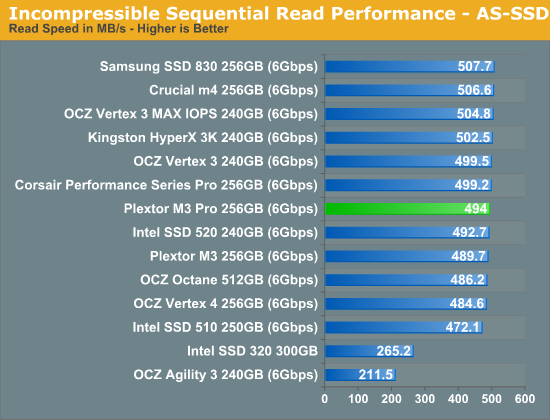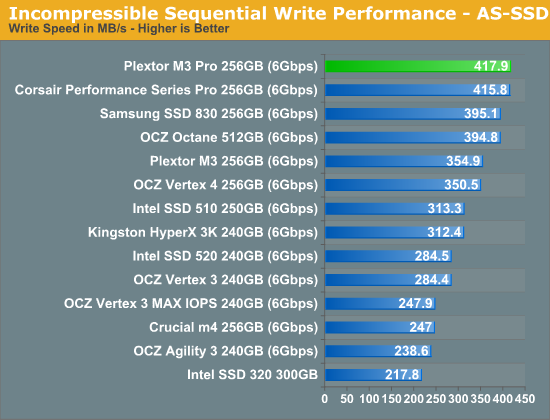Plextor M3 Pro (256GB) Review
by Kristian Vättö on July 1, 2012 1:45 PM ESTAS-SSD Incompressible Sequential Performance
The AS-SSD sequential benchmark uses incompressible data for all of its transfers. The result is a pretty big reduction in sequential write speed on SandForce based controllers, while other drives continue to work at roughly the same speed as with compressible data.

As I've said before, incompressible sequential read speed testing is very unsurprising nowadays to say the least, and the M3 Pro doesn't make an exception. It's 4.3MB/s (0.9%) faster than the M3 but when that is translated into percentages, we're essentially within the margin of error.

Incompressible sequential write performance, on the other hand, is another story. The M3 Pro comes out as the fastest drive we have tested, although it beats Corsair Performance Series Pro by only 2.1MB/s. However, the difference between the M3 and M3 Pro is 63MB/s (~18%), which is fairly significant.










55 Comments
View All Comments
Chaitanya - Sunday, July 1, 2012 - link
I associate names like plextor and lite-on with optical discs. now they are into solid state media as well. wondering whats next.DaFox - Sunday, July 1, 2012 - link
Plextor was amazing back when optical drives were relevant.iamkyle - Sunday, July 1, 2012 - link
You mean, before they stopped manufacturing their own driveslexluthermiester - Sunday, July 1, 2012 - link
Quote; "back when optical drives were relevant."Last time I checked, optical drives are still in very common use for a wide variety of purposes. How are they not still relevant?
HisDivineOrder - Sunday, July 1, 2012 - link
There was a time when a new CD-ROM or DVD-ROM would have people scouring the web for reviews because the new drive would offer greater and greater speeds.Nowadays, people just buy whatever's cheapest or goes good with their case. They MAY look at compatibility with discs beforehand, but often don't if they're looking at a $20 DVD-/+RW. If they do, that's a few user reviews and then bam, bought. If it's crap, they throw it away and buy another.
This is far from the ancient times when a CD-ROM or DVD-ROM would warrant a full-on review with technical read-outs, minor speed differences against other models, etc. There's no point now because they're so cheap and there are no new advances being done in the field because USB storage (flash and hard drives) became so damn cheap along with the proliferation of online with digital storage.
There's a new hotness in town and we should all queue up the Toy Story sad music for ODD's. I imagine all my ODD's talking in the dusty, plastic bin of forgotten tech. They scramble out and reminisce about the times I used to have with them. The old Lite-On DVD-RW chatting with a Plextor CD-RW. A 2x DVD-ROM by Creative talking to a Pioneer DVD-slot. Every now and then, a Zip drive crying, "Hai guyz! Im hear two!"
And them all looking at him, patting him on the head, and saying, "Adults are speaking." Then lil' Zip drive'll look down and mumble something about how he used to be awesome. Meanwhile, my Sound Blaster, Sound Blaster 16, Sound Blaster AWE, Audigy, Audigy 2ZS, Aureal, Diamond 3dFX Voodoo, Voodoo 2 SLI, Matrox G200, they all chat amongst themselves about the days back when PC's were actually hard to build, compatibility was a shot in the dark and a prayer bound by McGuyver's chewing gum, and when installing Windows involved starting it and wandering away for 10 minutes (or less).
The best days are behind us, I think. Strange how the easier things get, the less awesome they feel.
erple2 - Monday, July 2, 2012 - link
If these posts were rated, you sir, would receive a +1 from me. Trips down memory lane are always fun to do now and again. I remember amber buying my first Texel drive in the very early 90s because they were so Mich more reliable, and faster.Those were truly the halcyon days...
speculatrix - Monday, July 2, 2012 - link
+1So much of what used to be hard is now trivial, and the young generation really don't need to understand how computers work. Sure that's no bad thing for productivity, but means we're raising new generations who are unable to design the next generation of hardware.
Here is Cambridge England I see the average age of engineers rising all the time. Companies struggle to find truly gifted embedded skills.
StevoLincolnite - Monday, July 2, 2012 - link
Ah, the good old days of setting individual jumpers for a CPU's FSB, multiplier and voltage... Needing a dedicated cable that goes from your optical disk drive to your sound card JUST so you can play Audio...Setting IRQ's in the bios/windows... Fun days for the tinkerer.
Now everything is just plug and play pretty much.
versesuvius - Monday, July 2, 2012 - link
Let's see an Apple (McIntosh) user go down the memory lane. I suppose theirs turns out to be 1 centimeter in length. Something like:"It was always like this. We paid triple the amount a Windows user did. Then again we were always better than them. Steve Jobs may be gone, but we are still better than them. We are just better. Long live Steve."
Just joking, of course.
tjoynt - Monday, July 2, 2012 - link
+1 Internets to you Sir or Mam! Thank you for bringing me down memory lane and reminding me how difficult and exciting it used to be. :) Now that everything pretty much Just Works, much of the fun and mystery is gone.Sure I follow the next hotness too, but building a computer today is like building with legos: just follow the pictures and snap it together. No more IRQ conflicts or DMA errors. RAM incompatibility is still a source of "fun" but that has always been annoying rather than interesting.
Sure, we can focus on actually Getting Things Done now, but so can everyone else. Being a hardware geek is not as special anymore. Of course the complexity and flakiness of software will keep us well-rounded geeks well entertained (and employed) for quite a while to come. :)